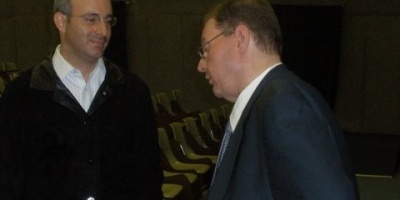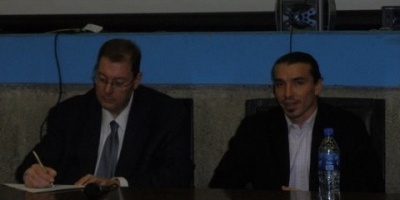FOR IMMEDIATE RELEASE
Contact Information: Hussein Ibish
January 31, 2009 - 1:00am
Washington, DC, Jan. 31 – ATFP Senior Fellow Hussein Ibish lectured at the University of Costa Rica Law School on Jan. 30 on the subject, “The Gaza Conflict: Summary and Future Impact.” Dr. Ibish told the audience of law students, faculty and diplomats that the Gaza conflict could be a turning point in the Palestinian-Israeli conflict, but its effects would more likely be decided by events in the West Bank in the coming 12-24 months as Palestinians and other Arabs would be comparing the results of the competing policies of confrontation and negotiation. Ibish stressed that the Palestinian Authority requires an immediate improvement in the quality of life in the West Bank and, more importantly, a settlement freeze and other political gains, in order to demonstrate that negotiations can make progress on Palestinian national goals.
En Espanol | In English

“Palestinians are faced with a choice between two competing and incompatible, indeed contradictory models,” Ibish said, “and over the next few years they will have to decide which path to follow.” He stressed that “what people want from their political leadership is success,” but that, “if they have to choose between failure that looks like passive surrender, and failure that looks like ‘glorious martyrdom’ in the name of God and country, they will choose the latter.” “Everyone must work to provide them the opportunity of choosing a third option,” he continued, “success based on reasonable policies, seeking a negotiated end-of-conflict agreement, and establishing a state to live alongside Israel in peace and security.”
Ibish expressed concern that the Gaza ceasefire was especially fragile because in his view, “neither side has fully achieved their minimal war aims, and both seem to feel that they benefited from the conflict politically.” He said that, “the civilians of Gaza were paying the price for what had in effect become a conflict in which domestic Israeli and Palestinian political rivalries were being played out through the violence.” Ibish said that in Gaza, “what has happened, driven by cynical political ambitions and narrow ideologies, is a humanitarian disaster spiced with some apparent egregious war crimes – indefensible massacres, deliberate killing of civilians, and use of white phosphorous munitions in densely populated areas.” However, he stressed, “the Hamas leadership was well aware of the likely consequences of their actions, as ATFP had clearly warned in articles back in June, 2008, and both sides could probably have avoided the conflict if they had wanted to.” “Sadly,” he said, “both seem to have wanted it, and both seem to feel that it went well for them politically.” He called it “a sad commentary on what some people are willing to do in pursuit of internal political power.” Ibish said that “avoiding the most disastrous consequences of the war will urgently require both material and political deliverables to the Palestinians that demonstrate the efficacy of negotiations and coexistence. This means not only moving immediately to improve the quality of life in the West Bank, but also securing political deliverables such as a settlement freeze that constitute significant political victories for those who wish to talk rather than fight.” He stressed that “the most significant battle will be waged in the upcoming 12-18 months, when Palestinians and other Arabs will be carefully drawing the contrast between the two approaches, especially with regard to nationalist goals.” He add that Gaza reconstruction had to be swift and thorough, but also managed in a way that does not increase the likelihood of a repeat of the violence or reward either side that propelled the conflict.”

Ibish added that, “like the Palestinian people, Israelis too have a choice to make.” He noted that the Israeli Ambassador in Costa Rica had said in the media the day before that Israel was committed to an end-of-conflict agreement based on two states. Ibish told the audience, “someone in your country should ask Amb. Eitam why, if Israel is committed to agreeing to a Palestinian state, it continues to build and expand settlements throughout the West Bank and especially in and around occupied East Jerusalem? We hear this all the time from Israeli diplomats, but their political leaders are making this goal impossible,” he added. He concluded, “The two-state solution is the only viable option for peace, but it has an expiry date. We need progress at once and the key is a settlement freeze, along with improved Palestinian security capacity and performance, and economic development.”
TAGS:
















